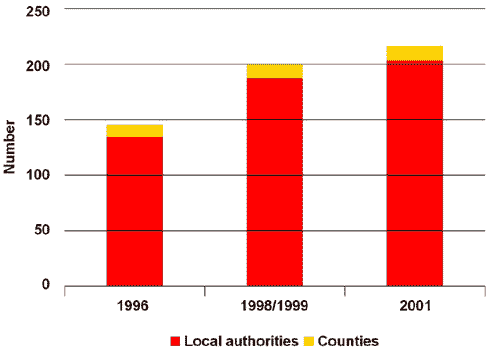Indicator Report
16. Public participation and Local Agenda 21
A sustainable society is based on democracy and openness and relies on popular participation and responsibility for decisions. Sustainable development can only be realised if all parts of Danish society are committed to working towards this goal. One of the messages in the Brundtland Report of 1987 and the Rio Declaration of 1992 was that active public participation is a prerequisite for achieving sustainable development and solving the environmental problems of the world. Denmark has a long tradition of involving the public. In the environment field, this tradition was followed up by an international agreement - the so-called Aarhus Convention of 1998. The work towards sustainable development depends on the population having easy access to information; being able to participate in decision-making processes; and having access to launch complaints on environmental matters.
If we are to achieve sustainable development globally, the principles of the Aarhus Convention should also apply in other countries. Denmark will work to ensure that these principles are employed more extensively in international agreements, and that initiatives to strengthen public access to information and participation are included in the results of the World Summit on Sustainable Development in 2002. Local Agenda 21 activities also play an important part in the efforts to realise sustainable development.
Developments - a summary
There has been an increase in the number of counties and local authorities working with Local Agenda 21, even though growth has been waning. Local Agenda 21 is characterised by the fact that activities aimed at sustainable development are carried out in accordance with local conditions and opportunities, often on a project basis. Counties and local authorities increasingly provide funding for citizen's initiatives in connection with Local Agenda 21.
Perspectives for development of indicators
Public participation is a central aspect of the work undertaken to promote sustainable development. This means that there is a need for establishing more specific indicators which describe how individual citizens participate in the efforts while also elucidating the more formally organised work carried out within Local Agenda 21 activities.
As regards formally organised local work, one possible indicator might address the number of public meetings or other activities which promote Local Agenda 21 activities. Examples of indicators which link formally organised work and the general public might be data that elucidate whether local or county authorities have initiated Local Agenda 21 activities at the initiative of private citizens, or which looks at the extent to which groups outside of the local or county authorities' own organisations take part in Local Agenda 21 activities. At present, this data is calculated every second year.

Indicator 16.1:
Number of counties and local authorities which have started working with Local Agenda
21
Source: The Ministry of the Environment, the Spatial Planning Department
This indicator elucidates developments in Local Agenda 21 activities. Local Agenda 21 is characterised by the fact that activities aimed at sustainable development are carried out in accordance with local conditions and opportunities. This means that no single definition exists. The work is, however, characterised by a holistic approach, cross-sectoral thinking, public participation, awareness of (life)cycles and global considerations, and longterm perspectives.
Compared to the developments in participation from 1996 to 1998, the period 1998 to 2001 still showed increases. Growth has, however, been lower in recent years.
There has been an increase in the number of counties and local authorities working with Local Agenda 21, and Local Agenda 21 activities are becoming ever more widespread and firmly anchored. This is apparent both in relation to the width of activities performed and the number of stakeholders involved. At the same time, counties and local authorities increasingly provide economic support for citizen's initiatives in connection with Local Agenda 21.